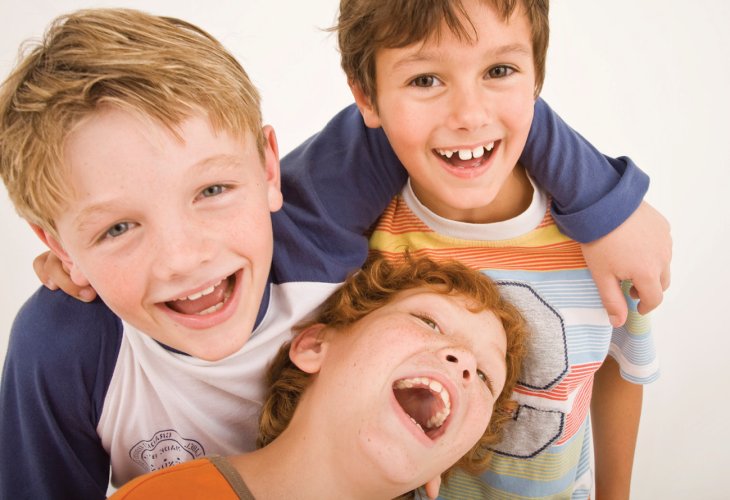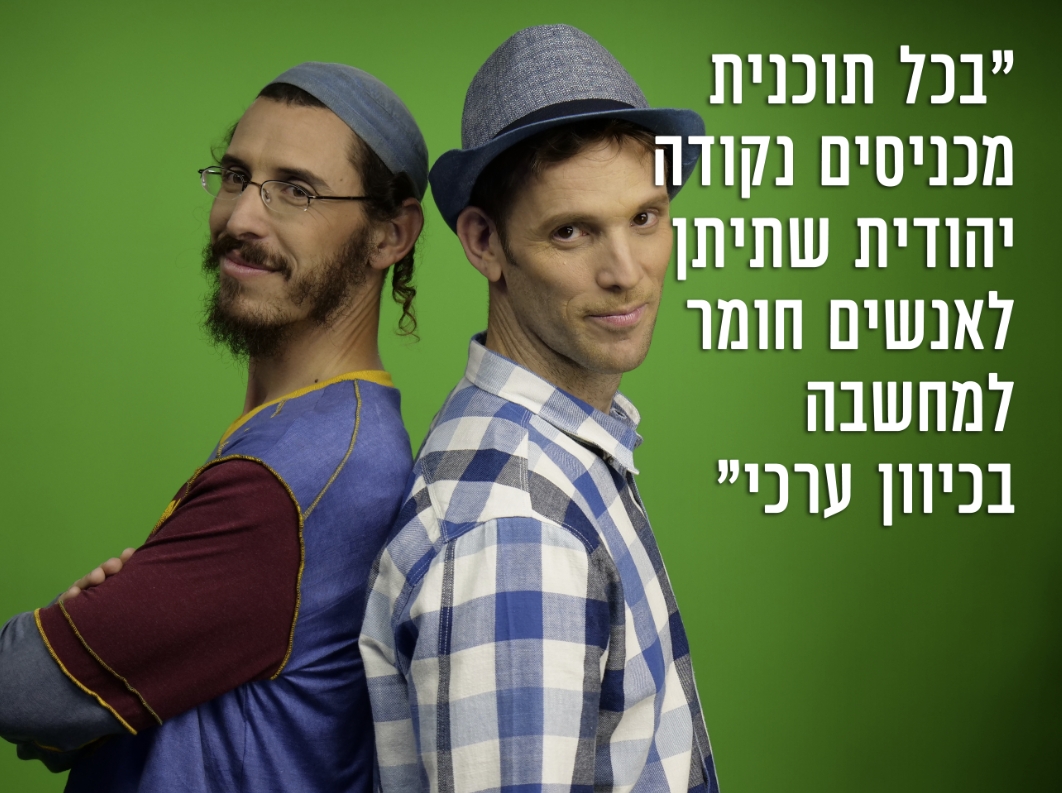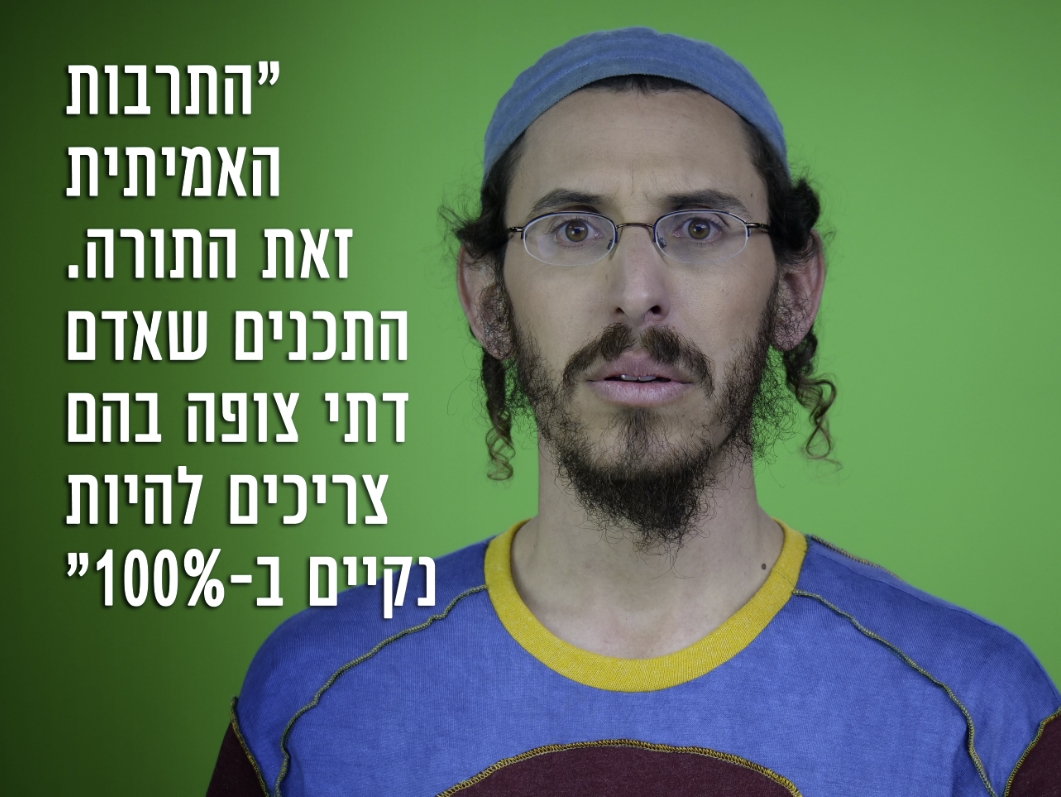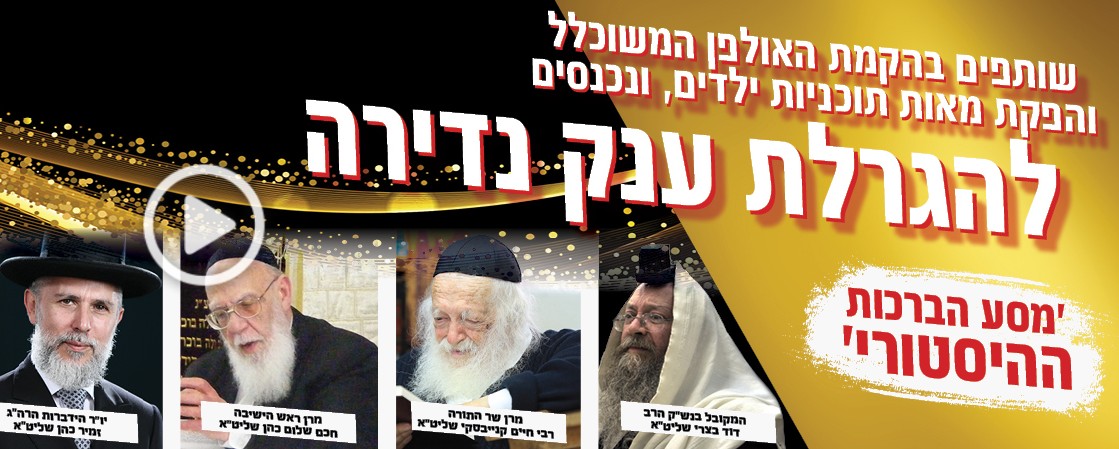Yahal Chazan, Actor in "Our Station," Reveals Behind-the-Scenes Secrets
How does a religious actor integrate his beliefs into the world of acting, why is a child like a sponge, and what responsibility lies on parents? Yahal Chazan, actor in "Our Station," shares his insights.
 Yahal Chazan (Photo: Shmuel Lugasi)
Yahal Chazan (Photo: Shmuel Lugasi)Actor Yahal Chazan is one of the main actors in the children's and youth show "Our Station." Through humor, flowing text, and emotional life scenes, the program successfully deals with content that engages children and teenagers. Yahal Chazan met Shay Shavit, who acts alongside him on the set. Along with Berdugo, a fish puppet who is also a cook, they occupy an old warehouse at a train station, which they have turned into a kind of camp where their friends arrive. Each episode revolves around a different plot and touches on children's world and issues that interest them, such as how to deal with jealousy between friends, telling the truth at all costs, learning with joy, complimenting a friend who receives a more valuable gift, sensitivity to a cousin with celiac disease, and even what happens when a sandwich is found in a backpack just before the Seder night. The program is an original production of the Hidabroot channel, directed by Revital Balali-Tsimring, the program's creator.
Yahal Chazan, 35, a resident of Shiloh, is a father of three. He is an actor and puppeteer, and he acquired his puppet theater and acting education at the Puppet Theater School in Holon. "When I was a little boy, I actually wanted to be a painter," he recalls, "as I grew up, I was drawn to the acting world. I shifted my interest in plastic artistry from drawing to puppet sculpture. In my childhood home, we absorbed a culture based on Judaism. My father is Professor of Piyut Ephraim Chazan, so art was definitely part of childhood and the values we grew up on. For example, when my father would give a Torah lesson at the table, he would bring a piyut from Rabbi Yehuda Halevi."
Was the decision to study acting accepted in your surroundings?
"Although my parents wanted me to go to academia, they gave me the freedom to decide and choose for myself what to do. Both my brother and sister, who are older than me, are involved in arts. Every actor has a point where they love being looked at, in a way that's partly why they choose the profession, but not from a place of seeking audience admiration. I love making people laugh. One difficulty a religious/ultra-Orthodox actor faces is not what society says about you, but how to earn a living from the art as an actor. Many folks gave up after experiencing financial hardships and decided to leave the field. Every actor knows these challenges.
"You need faith in Hashem and faith in yourself since making a living is a matter of security in Hashem, and acting is not a regularly demanded profession. When you're a religious actor, you experience a bigger challenge, as most job offers in theaters do not target religious actors who tend not to work in the large, funded theaters. Some actors do make certain compromises, but it is not simple. In this sense, 'Hidabroot' is a wonderful place, there is room to use great talents according to Halacha. My work as an actor becomes part of Avodat Hashem, which even contributes to increasing the world's repair and elevating the Shechina."
In parallel to his acting work, Yahal teaches dropout youths the puppeteering profession. "The work with them is wonderful, b"h. I meet amazing folks who didn't fit into regular frameworks. I teach in a youth village, a less stressful framework where they are allowed to do things outside the box, one of which is puppeteering. It's a fantastic opportunity to see them create and perform with the puppets. They experience a sense of success."
Watch a crisis at the camp on Passover eve. Shay and Yahal fight, reconcile, laugh, and enjoy together with Berdugo and "Yetzar" the parrot in one of "Our Station" episodes:
Entertainment and Jewish Message: A Clean Alternative to Problematic Content
Yahal met his co-star on the show, actor Shay Shavit, at the Hidabroot studios. "We've been working together for a year and a half on the show and actually met at 'Hidabroot.' I really enjoy working with him. It is a show of two central characters, and the dynamics between us are good; we are opposites that get along on camera excellently. Every time there's a lunch break for the crew and actors, we say words of Torah. I've noticed that in many cases, the words of Torah that are said by the crew relate to the educational and Torah contents the program deals with, since that's what's on our minds on that day." The show is filmed once a week, sometimes in one filming day, one episode or double episodes are shot.
"Our Station" is a show that combines educational messages in a light and non-didactic way. "There are value messages in the program that are conveyed in a fun and light way," explains Yahal. "The channel is currently undergoing massive renewal, new original productions are being written and filmed, and there is a lot of investment in both content and form, not even embarrassing commercial channels. We strive to create a kids' program that is clean, valuable, and takes children forward to the precise places of true Jewish values."

As a parent, what is important to you in the shows your kids watch?
"As parents, we want value-based shows that are founded on the love of Hashem and fear of Heaven. In the show 'Our Station', a spiritual committee reviews and checks the contents. Although this sometimes creates artistic challenges, the more we are challenged, the more creative the outcome.
Yahal gives an example: "For instance, we did an episode on safe bike riding, and I wanted to demonstrate to Shay, the other character, what happens when a person rides without a helmet and falls off the bike. In the script, it was written that I take two watermelons – one with a helmet and one without. To illustrate what happens to someone who rides without a helmet, we needed to drop both of them. This way, the children would see tangibly that the helmeted watermelon stays intact, while the other one shatters. The message was undoubtedly strong, and it was clear to us that every kid who saw this would put on a helmet without a second thought. The script was presented to the spiritual/value committee, which rejected the idea because it involves "bal tashchit" (wanton destruction), and the concern it might educate the wrong way – God forbid to disrespect food.
"We had to think of a solution. In the end, we did a very successful scene with balloons on which we painted faces; it turned out much better than the original idea. This limitation actually brings out higher quality and more beautiful things, enhancing our inventiveness."
Unregulated consumption of culture, even kosher, is very problematic. It's important to remember that television is a destructive device, and watching movies is not recommended at all, both by educators and professionals. Parents must be very aware and consider whether their child needs to watch programs or if they can find more positive activities. If parents do allow their child controlled viewing times, it is important that they be very critical about the content he is watching. "We create content that suits us and our children," says Yahal. "In doing so, those deciding what will be seen on the screen here are people coming from worlds of holiness and Torah, without compromising on quality and form."

"The real culture is the Torah," Yahal repeats. "And let's not forget that a religious person's leisure culture is very different from that of a non-observant person. The content that a religious person watches must be 100% clean."
Yahal performs for religious children on behalf of their educational institutions, and even before the public during vacations or leisure times. "We always try to ensure that in addition to entertainment, there is a Jewish message, a Jewish point that offers people something to think about in a value-oriented way."
"The most important thing to us is our children; they are the next generation. A child is like a sponge – what you show him, he absorbs. He grasps what's presented to him from the outside or at home or other places. The more quality and valued the content, the more the child grows in a healthy and proper way. It affects him for years. The Nation of Israel and the next generation are our investment in the future. As they say, 'He who cares for days sows wheat, he who cares for years plants trees, he who cares for generations educates people,'" concludes Yahal.
Shay and Yahal prepare the camp for Passover, and find memories. Watch one of "Our Station's" shows:
So, what can be done to change the situation? A lot! The Hidabroot channel plans to produce hundreds of educational and value-based children's programs in a new and advanced studio. But to bring the program to life, we need you! Click here for more details


